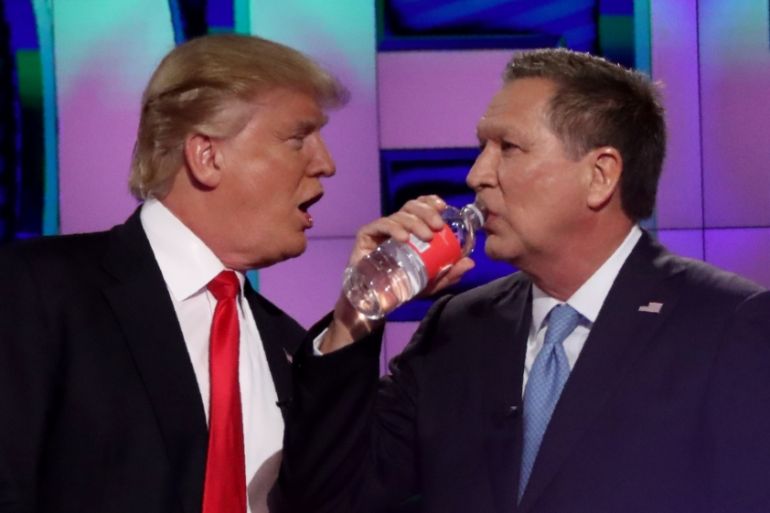Riding high in polls, Biden begins courting Republican voters
John Kasich is among a handful of high-profile Republicans likely to become more active in their support for Joe Biden.

In the four months since Joe Biden effectively won the Democratic presidential nomination, he has focused on consolidating the party’s divergent and often warring internal factions. As the closing stretch of the campaign nears, he is turning his sights on another, more elusive, prize – Republicans disaffected with President Donald Trump.
Biden’s first score? Former Ohio Governor John Kasich, a Republican and frequent Trump critic, who is expected to speak at the Democratic National Convention on Biden’s behalf next month. Kasich, who ran for the Republican presidential nomination in 2016, is among a handful of high-profile Republicans likely to become more active in supporting Biden during the campaign.
Keep reading
list of 4 itemsTrump ally Rudy Giuliani files for bankruptcy following defamation case
‘Insurrection’ should bar Donald Trump from US presidency, lawyers argue
Ex-Proud Boys leader Joseph Biggs sentenced to 17 years for US Capitol riot
Trump, meanwhile, is doing virtually nothing to expand his appeal beyond his most loyal supporters. Some Republican operatives believe the suburbs are lost while a contingent of high-profile Republicans is openly questioning the president’s re-election message. In an acknowledgement of the mounting challenges, Trump named a new campaign manager last week.
In crucial battleground states such as Florida, some Democrats are concerned that Biden’s current standing could be a high-water mark, however. Some polls suggest Biden’s strength comes more from voters’ displeasure with Trump than excitement about Biden, whose regular gaffes, long Washington record and recent attempts to appease progressives leave him in a tougher spot than some Democrats would like to believe.
I see lots of Dems complaining about Kasich possibly speaking at the Dem Convention to endorse Biden. THIS is why Dems lose so often – too many voters who care more about purity than victory. Kasich has a huge # of supporters. If 2% of them vote Biden because of this, Biden wins.
— Kurt Eichenwald (@kurteichenwald) July 20, 2020
Florida Agriculture Commissioner Nikki Fried, the only Democrat elected to statewide office there, praised Biden’s message and said he could appeal to rural and middle-class voters. But she said “it’s way too early” to predict a victory.
“As we get closer, polls are going to get tighter,” Fried said.
That happened in 2016 when Trump narrowly won the election after trailing Hillary Clinton in the polls for months. The Democrats’ reluctance to enjoy the current moment reflects the sting of that loss, Biden’s nagging vulnerabilities and Trump’s mountain of campaign cash.
Trump’s campaign has reserved $146m in television advertising, led by a $36.3m investment in Florida alone, according to data compiled by Advertising Analytics. That is more than double the next closest state, Ohio, where Trump has reserved $18.4m. Biden, so far, has not reserved any advertising for the final months of the campaign, although he’s amassed a fortune in recent months that will allow him to compete, even if he cannot match Trump dollar for dollar.
While the specific ads have yet to be finalised, Trump’s team signalled it was preparing to ramp up attacks on Biden’s record and mental competence designed to “redefine” the lifelong politician and scare away tentative supporters. Underlying the strategy is a risky assumption that the coronavirus and related economic devastation will improve before voting begins.
“A lot of people know Joe Biden. They don’t know about Joe Biden’s record. Right now, he is this blank canvas,” said Nick Trainer, the Trump campaign’s director of delegates and party organisation. “As they get more and more information about what Joe Biden’s done and what he’ll do, I’m more and more confident.”
🚨🚨 It’s starting.
Democrats are caving to the radical left-wing mob.
See for yourself:
— Senate Republicans (@SenateGOP) July 19, 2020
Republicans working on congressional races across several battleground states believe the nation’s suburbs, where higher-educated white voters have traditionally favoured the Republican Party, are almost completely lost for Trump. These voters, they warn, are more intensely opposed to Trump’s re-election than they were during the 2018 midterm elections, when a suburban backlash allowed Democrats to seize a majority in the US House of Representatives.
The suburban shift is emblematic of Biden’s potential to expand the Democratic coalition to include more women, seniors and moderate Republicans, who may have reluctantly voted for Trump or a third-party candidate in 2016, but may vote for a Democrat in 2020 after watching Trump struggle to govern.
Biden’s team would not confirm specific discussions with Kasich, but deputy campaign manager Kate Bedingfield acknowledged the campaign has begun working with Republicans, just as it has worked with progressives in recent months. At the least, she said GOP backers could help mute Trump’s efforts to paint Biden as a tool of the left.
“In terms of Republican supporters, I think it speaks to a career of being able to work across the aisle, of being able to actually get things done,” Bedingfield said. “We welcome the support of anybody who’d rather see Joe Biden be president than Donald Trump.”
|
|
Trump’s team believes the president will eventually benefit when the explosion of coronavirus infections begins to subside, and the economy recovers.
So far, the numbers are moving in the opposite direction. The nation continues to break new records of daily infections, and several states have scaled back reopening plans.
“It’s really a perfect storm coming. It’s like Trump’s on a sinking ship,” said former Virginia Governor Terry McAuliffe, a prominent Biden ally.
“Everybody every day is now dealing with coronavirus in their personal lives,” he told The Associated Press news agency in an interview. “Yeah, they’re going to blame Trump. They should. And there’s nothing he can do about it.”
Still, McAuliffe warned: “If any party can screw this up, it’s the Democratic Party.”
